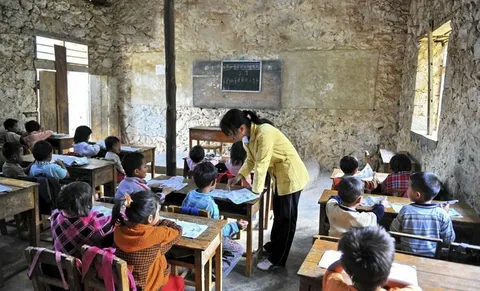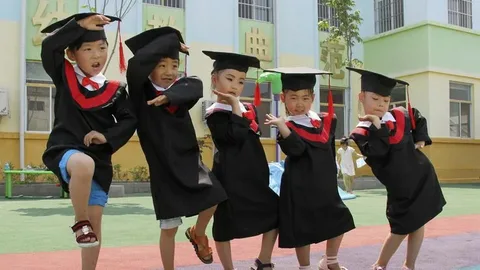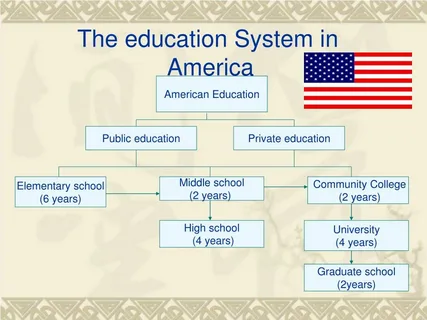Chinese and British Education System for Different Age
Have you ever wondered how educational structures across China or the UK compare, particularly in relation to the different generations?
Are you a mom, dad, or teacher, or simply interested in what the world educates its children and how to teach them? Then you’re at the right place.
We’ll simplify it and simplify it.
How Does Education Differ for Different Ages?
Let’s face it. No matter whether the country is China or the UK, the main idea is to help children prepare for the world. However, how does each country approach the issue? It’s a different matter.
Both countries begin their education at an early age. But where do they differ?
Learning in Early Childhood: China vs. UK

China’s Approach:
- Children start around 3 years of age at the age of kindergarten.
- The focus is on academics from the beginning, especially in the cities.
- Even in this day and age, there is a strong emphasis on studying Mandarin as well as math and group activities.
UK’s Early Childhood:
- The United Kingdom’s early years foundation stage (EYFS) begins at the time of birth until age 5.
- It’s all about playing-based learning.
- Think about playing, exploring, and nurturing your imagination.
- Formal academics? But not yet. They will start later.
Primary Education: What Changes?
Things are getting more urgent.
China:
- Primary education begins at the age of 6 and lasts for 6 years.
- It’s intense. The kids are immersed in mathematics, Mandarin, science, and more.
- The aim? Establish a solid base. When children reach 12, they’ve covered many more miles than the kids in other nations.
- Schools are very competitive and parents work hard to get high marks.
UK:
- Primary education begins around five years old and continues for six years too.
- In this case, it’s more balanced. The focus is on the math and English yes. However, kids also focus with sports, arts and personal growth.
- It’s not as tested-driven as China’s system is at this point.
Secondary Education: Where It Gets Serious
Here’s the place where these two systems truly have to be.
In China:

- Secondary school begins at the age of 12 and can be extremely difficult.
- Two levels: junior and senior secondary.
- When kids reach the senior level of secondary school (around 15-16) and are studying to take the Gaokao, which is the national test. Let’s just say that it’s a lot of work.
- The test is essentially what determines the future of your child. It will determine which college you are able to attend as well as which job options are open, and, in all honesty, it’s extremely stressful.
In the UK:
- Secondary education begins at the age of 11.
- First big exam? The GCSEs at age 16. At that point, students are able to decide if they want to pursue A-levels or vocational education or apprenticeships.
- It’s flexible. Students can design their education according to their preferences, job goals, or, let’s be honest, what they’re excellent at.
University and Beyond
China:
- If you can pass the Gaokao and you are accepted into the top universities. Simple, right? But it’s not.
- Chinese universities aren’t easy to enter, especially those that are top of the line. There’s enough emphasis on medicine, engineering, and fields that can make you eligible to secure the possibility of a steady, well-paying job.
- Once you’re accepted in the midst of it, the pressure isn’t going to decrease. The goal of graduating with top marks is the main goal.
UK:
- Admission to universities is contingent upon the A-level outcome as well as equivalent certificates.
- Students are more free to select a broad range of subjects.
- The focus of universities is the concept of independent learning. Students are expected to be self-driven.
- It’s not all about the exams. A majority of courses comprise a mixture of examinations, coursework, as well as projects and work experience.
Why the Differences?
The differences are due to the culture and priorities.
- China places a high value on discipline, dedication, hard work, as well as academic success. It’s believed that the hard work of students leads to success and that education is essential to upward mobility.
- The UK There’s more emphasis on creating well-rounded people. It’s not only about education; there’s an emphasis on creative thinking, critical thinking and personal development.
Which Is Better?

There’s no standard answer to this.
- Chinese Education could produce stars in the academic world But some think that it’s too rigid and puts children under too much pressure.
- The UK school system is highly praised because of its flexibility and the whole child approach However, some people believe it’s not pushing pupils suitable academically, particularly when in comparison to other countries such as China.
It is all about what you consider important to you. Academic excellence? Flexibility? Mental health?
FAQs
1. What is the age at which education begin in China as well as the UK?
In China, formal education generally begins at the age of three and is completed by kindergarten. In the UK, the process begins slightly earlier and includes the structured learning program beginning from the age of birth until age five, according to the EYFS.
2. How does the primary education system differ in China as compared to the UK?
In China, the primary school system is extremely focused on academics and begins at age 6 and lasts for 6 years. In the UK, the primary school year begins at age five, and the way of teaching is more balanced with an equal amount of subjects that are creative and academic.
3. What is the main difference between secondary education and secondary education in China in comparison to the UK?
Chinese secondary schooling is focused on tests with an emphasis on preparing students for Chinese’s Gaokao. In the UK, the system is much more flexible, as students take exams for GCSEs and decide on the next step based on their interests or job objectives.
4. What exactly is the Gaokao, as well as why is it so important?
The Gaokao is China’s official entrance exam to universities. It’s extremely important as it determines the type of college a student is able to take and, as a result, their future job possibilities.
5. How can Chinese universities and British institutions differ?
Chinese universities can be difficult to access as they are focused on tests. In the UK universities, there is greater flexibility, with an emphasis on the ability to learn on your own as well as a mixture of tests as well as opportunities for work-based learning.
Final Thoughts
Whichever you choose, whether you favor the intensity of China’s educational program as well as the equilibrium provided in the UK, both have advantages and disadvantages.
If you’re contemplating one of the systems for your child—or you, for that matter—think about what is most important to you: academic excellence, flexibility, or a balance?
After we’ve looked at two systems, which do you think meets your requirements better?




